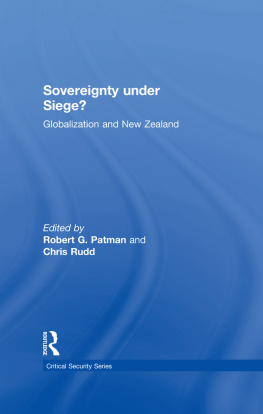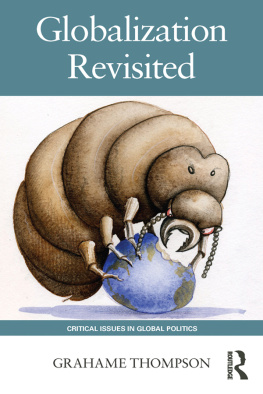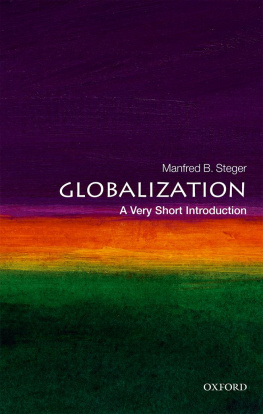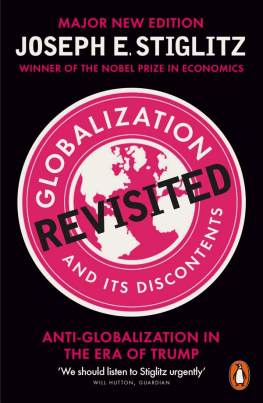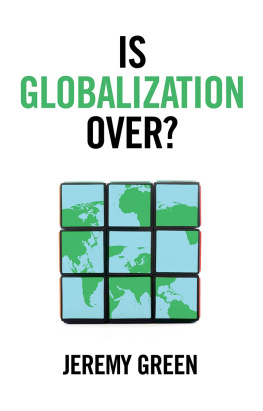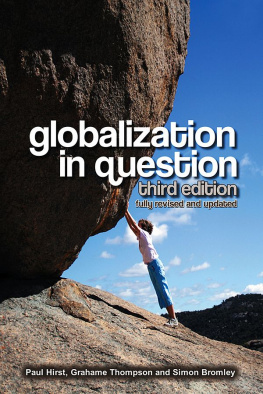Contents
List of Figures
List of Tables
Guide
Pages

The Sociology of Globalization
Second Edition
LUKE MARTELL
polity
Copyright Luke Martell 2017
The right of Luke Martell to be identified as Author of this Work has been asserted in accordance with the UK Copyright, Designs and Patents Act 1988.
First published in 2010 by Polity Press
This edition first published in 2017 by Polity Press
Polity Press
65 Bridge Street
Cambridge CB2 1UR, UK
Polity Press
350 Main Street
Malden, MA 02148, USA
All rights reserved. Except for the quotation of short passages for the purpose of criticism and review, no part of this publication may be reproduced, stored in a retrieval system, or transmitted, in any form or by any means, electronic, mechanical, photocopying, recording or otherwise, without the prior permission of the publisher.
ISBN-13: 978-0-7456-8980-7
A catalogue record for this book is available from the British Library.
Library of Congress Cataloging-in-Publication Data
Names: Martell, Luke, author.
Title: The sociology of globalization / Luke Martell.
Description: Second edition. | Cambridge, UK ; Malden, MA : Polity Press, 2016. | Includes bibliographical references and index.
Identifiers: LCCN 2016010247 (print) | LCCN 2016016175 (ebook) | ISBN 9780745689760 (hardcover: alk. paper) | ISBN 0745689760 (hardcover : alk. paper) | ISBN 9780745689777 (pbk. : alk. paper) | ISBN 0745689779 (pbk. : alk. paper) | ISBN 9780745689791 (mobi) | ISBN 9780745689807 (epub)
Subjects: LCSH: Globalization--Social aspects.
Classification: LCC JZ1318 .M37 2016 (print) | LCC JZ1318 (ebook) | DDC 303.48/2--dc23
LC record available at https://lccn.loc.gov/2016010247
The publisher has used its best endeavours to ensure that the URLs for external websites referred to in this book are correct and active at the time of going to press. However, the publisher has no responsibility for the websites and can make no guarantee that a site will remain live or that the content is or will remain appropriate.
Every effort has been made to trace all copyright holders, but if any have been inadvertently overlooked the publisher will be pleased to include any necessary credits in any subsequent reprint or edition.
For further information on Polity, visit our website: politybooks.com
Preface to the Second Edition
For this second edition I have edited through the book for style and repetition. The data has been updated throughout.
I have expanded the section on gender inequality and globalization in ). Updates to other chapters reflect the rise of developing Asia.
There is a new section on globalization and the environment in the chapter on global politics (). I have revised discussions of the Internet.
I have added sections on the sociological theorist Pierre Bourdieu to the second chapter on media and culture () I have included a discussion of the Transatlantic Trade and Investment Partnership.
There is a new section in the chapter on anti-globalization ().
In the first chapter on migration (), updating it and expanding especially on brain drain and open borders.
Themes such as racism and international organizations are discussed not in separate sections but throughout the book. There is some extra material in this edition that relates to these areas.
I have updated recommended reading. I have added more up-to-date references.
To make space for additions the publisher asked me to remove the chapter on war, so I have done this. However, this is an important area, often neglected by sociologists, and this chapter is available in the first edition.
I hope that the book will read better, be more up to date, and be more challenging for some at higher levels, and that the new sections will improve the coverage of the book and its interest for readers.
Abbreviations
ASEANAssociation of Southeast Asian NationsATTACAssociation for the Taxation of Financial Transactions for the Aid of CitizensCETAComprehensive Economic and Trade AgreementDACDevelopment Assistance CommitteeECEuropean CommissionECHREuropean Convention on Human RightsECtHREuropean Court of Human RightsEEAEuropean Economic AreaEUEuropean UnionFDIforeign direct investmentG8Group of EightGATTGeneral Agreement on Tariffs and TradeGDPgross domestic productGDRGerman Democratic RepublicGMgenetically modifiedGNIgross national incomeGNPgross national productHDIhuman development indexIGOinternational governmental organizationILOInternational Labour OrganizationIMFInternational Monetary FundINGOinternational non-governmental organizationMNCmultinational corporationNAFTANorth American Free Trade AgreementNAMNon-Aligned MovementNATONorth Atlantic Treaty OrganizationNGOnon-governmental organizationNICnewly industrializing countryNPTTreaty on the Non-Proliferation of Nuclear WeaponsNWICONew World Information and Communication OrderODAofficial development assistanceOECDOrganisation for Economic Co-operation and DevelopmentOPECOrganization of Petroleum Exporting CountriesRMARevolution in Military AffairsSAPsstructural adjustment policiesTNCtransnational corporationTTIPTransatlantic Trade and Investment PartnershipUDHRUniversal Declaration of Human RightsUNUnited NationsUNCTADUnited Nations Conference on Trade and DevelopmentWHOWorld Health OrganizationWMDsweapons of mass destructionWTOWorld Trade Organization
Introduction: Concepts of Globalization
There have been many trends in sociology in recent decades. These have varied from country to country. One was a concern with class and social mobility from the 1950s onwards, in part evident in debates between Marxists and Weberians. In the 1960s and 1970s, feminists argued that such debates had marginalized another form of social division, gender inequalities. Feminism grew in influence, itself being criticized for failing to appreciate other divisions, for instance ethnic inequalities, identified by those with postcolonial perspectives. In the 1980s, this concern with differences was highlighted in postmodern ideas, and the power of knowledge was analysed by theorists such as Michel Foucault. In the 1980s and 1990s, a more homogenizing idea came to the fore, globalization. This also went on to stress local difference and plurality. The themes of globalization were not new, but the word and the popularity of the idea really came to prominence in the 1980s (an early mention is in Modelski 1972).
Why did globalization become a popular idea? One reason is the rise of global communications, especially the Internet, which made people feel that connections across the world were flowing more strongly and speedily, as well as becoming more democratic. With the end of the cold war, it seemed that the bipolar world had become unified, whether through cultural homogenization or the spread of capitalism. People became increasingly conscious of global problems, such as climate change. Economic interdependency and instability were more visible. Money flowed more freely and national economies went into recession together in the 1970s and again thirty years later. From the 1970s onwards, one of the building blocks of the national era, the nation-state, seemed to be under threat. Welfare states became cumbersome and expensive, and economic liberals like Ronald Reagan and Margaret Thatcher led the world in rolling them back.
The first half of this introduction will look at the sociology of globalization and themes of the book. The second half will discuss the concept of globalization.



